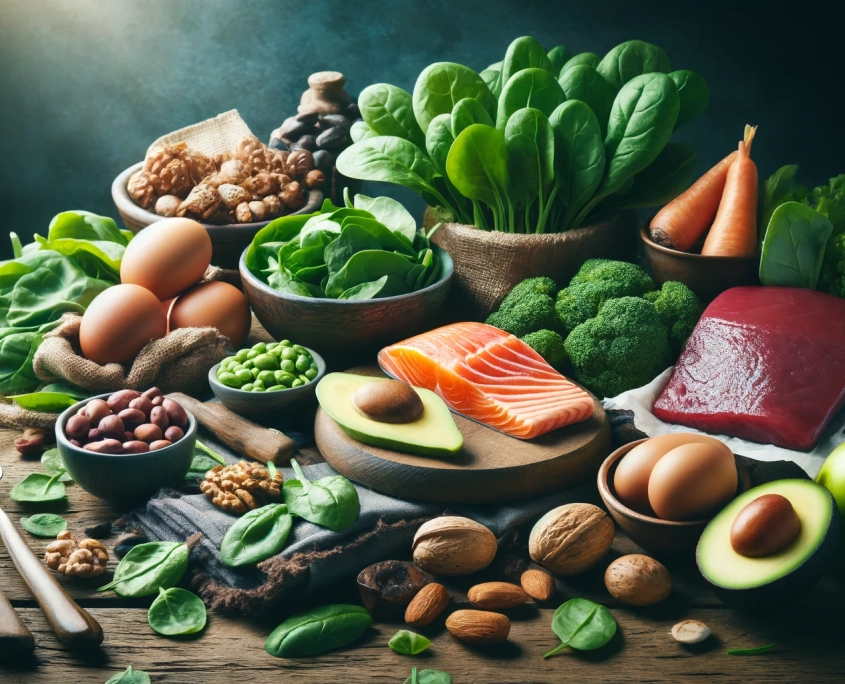Essential Nutrients: Vitamins and Minerals Guide

Understanding Their Roles and Common Food Sources
Recognizing the roles and sources of essential vitamins and minerals is helpful for maintaining a healthy lifestyle. By incorporating a variety of these nutrient-rich foods into your diet, you can ensure that your body receives the necessary components it needs to function optimally. Remember, a well-balanced diet not only supports physical health but also enhances mental well-being. Let this guide assist you in making informed choices towards a healthier and more vibrant life.
Vitamins
Vitamin A
Uses: Supports skeletal and soft tissues, mucous membranes, skin, teeth, vision, and fertility.
Sources: Liver, egg yolks, sweet potatoes, cod liver oil, salmon, tuna, carrots.
Vitamin B Complex
B1 (Thiamine)
Uses: Essential for ATP production and nerve function.
Sources: Pork chops, mussels, tuna, salmon, black beans, sunflower seeds.
B2 (Riboflavin)
Uses: Aids in breaking down proteins, carbohydrates, and fats; contributes to ATP production.
Sources: Liver, yogurt, milk, spinach, almonds, eggs.
B3 (Niacin)
Uses: Converts food into energy; essential for the nervous system.
Sources: Liver, red meat, chicken, tuna, turkey, salmon, avocados, mushrooms.
B6 (Pyridoxine)
Uses: Important for red blood cell production, brain health, sleep, appetite, and mood regulation.
Sources: Milk, salmon, tuna, eggs, chicken liver, beef, carrots, spinach.
B7 (Biotin)
Uses: Helps convert food into energy; supports skin, hair, eyes, liver, and nervous system health.
Sources: Egg yolk, liver, legumes, sweet potatoes, mushrooms.
B9 (Folate)
Uses: Critical for new cell creation, DNA synthesis, and red blood cell maturation.
Sources: Legumes, asparagus, eggs, leafy greens, beets.
B12
Uses: Supports nerve cell function, red blood cell formation, DNA synthesis, and brain health.
Sources: Liver, organ meats, clams, sardines, red meat, tuna.
Vitamin C
Uses: Acts as an antioxidant, essential for collagen production, enhances iron absorption, and boosts the immune system.
Sources: Camu camu berries, cherries, kiwis, yellow peppers, lemons, kale, oranges, papaya.
Vitamin D
Uses: Essential for calcium absorption, bone growth, immune system function, and mood regulation.
Sources: Salmon, egg yolks, cod liver oil, tuna, mushrooms.
Vitamin E
Uses: Acts as an antioxidant, supports immune function, cellular signaling, and skin health.
Sources: Red palm oil, seeds, almonds, spinach, avocado, olive oil.
Vitamin K
Uses: Essential for blood clotting, calcium metabolism, and heart health.
Sources: Liver, chicken, pork, kale, spinach.
Minerals
(Macro Minerals)
Sodium
Uses: Regulates fluid balance, nerve transmission, and muscle contraction.
Sources: Salt, salty foods.
Chloride
Uses: Maintains proper fluid balance, aids in the production of stomach acid.
Sources: Salt, small amounts in meats and seafood.
Potassium
Uses: Essential for fluid balance, nerve transmission, and muscle contraction.
Sources: Avocados, sweet potatoes, watermelon, coconut water, spinach, potatoes, fish.
Calcium
Uses: Crucial for healthy bones and teeth, muscle contractions, nerve function, blood clotting, and regulating blood pressure.
Sources: Dairy products, sardines, leafy greens, beans.
Phosphorus
Uses: Supports healthy bones and teeth, cellular creation, and energy utilization.
Sources: Chicken, turkey, pork, red meat, organs, seafood, dairy.
Magnesium
Uses: Involved in numerous bodily processes including energy creation, nervous system regulation, muscle movements, and DNA repair.
Sources: Cacao, leafy greens, often supplemented due to dietary deficiencies.
Sulfur
Uses: Integral to protein molecules, DNA building and repair, cell protection.
Sources: Red meat, chicken, organ meats, dairy, eggs, legumes.
(Trace Minerals)
Iron
Uses: Essential component of hemoglobin in red blood cells; crucial for energy metabolism.
Sources: Organ meat, red meat, fish, chicken, seafood, egg yolks, spinach.
Zinc
Uses: Required for the activity of over 300 enzymes, nutrient metabolism, immune system maintenance, and tissue growth and repair.
Sources: Oysters, red meat, pork, crab, shrimp.
Iodine
Uses: Vital for thyroid hormone production.
Sources: Seaweed, cod, iodized salt, shrimp, tuna, dairy.
Selenium
Uses: Powerful antioxidant, supports infection resistance, reproductive health.
Sources: Brazil nuts, fish, pork, beef, turkey, cottage cheese, eggs, brown rice.
Copper
Uses: Necessary for enzyme functions, red blood cell formation, bone and connective tissue development, iron metabolism.
Sources: Liver, oysters, spirulina, shiitake mushrooms, lobster.
Chromium
Uses: Assists insulin in regulating blood sugar levels; aids in the metabolism of proteins, carbohydrates, and fats.
Sources: Grape juice, beef, orange juice, apples.
Manganese
Uses: Component of several enzymes important for bone health, wound healing, and metabolism.
Sources: Mussels, nuts, brown rice, oysters, clams, kale, spinach.
Cobalt
Uses: Crucial part of Vitamin B12; important for cellular function and red blood cell production.
Sources: Red meat, fish, leafy greens, figs, nuts.
Boron
Uses: Aids in metabolizing vitamins and minerals, supports bone health, and influences hormone production.
Sources: Prune juice, avocados, raisins, apples.
This list of essential vitamins and minerals illustrates their indispensable roles in promoting and maintaining human health. By integrating a diverse array of nutrient-rich foods into our diets, we not only cater to the body’s complex biochemical needs but also fortify our defenses against various health issues. This simple guide serves as an introduction for individuals aiming to optimize their nutritional intake, thereby contributing to a holistic approach to health that is both preventive and curative. As we continue to study the intricate interactions between food chemistry, nutrition and bodily functions, the importance of a well-rounded diet remains a fundamental principle in the pursuit of overall well-being and longevity.
